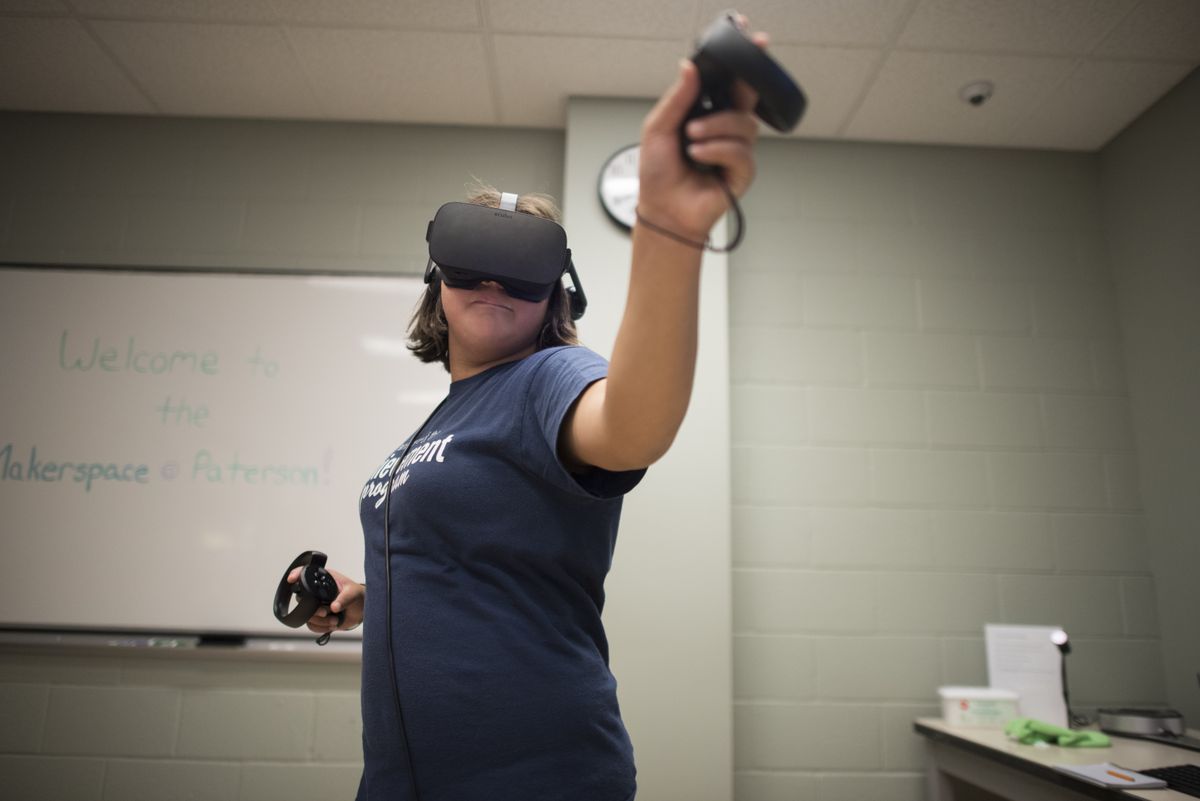Eliza Paul was building paper race cars in the engineering department at Lakehead University when she was nine years old. She also learned how to monitor someone’s heart rate, studied Indigenous history and earned financial credits to cover tuition in her freshman year that was still almost a decade away.
It was part of a creative initiative that connected the Thunder Bay, Ont.-based university with schools in the area, helping provide children as young as Grade 4 who face socioeconomic challenges a chance to start envisioning their futures early and earn financial support to make it a reality.

Thirteen-year-old Grade 8 student Eliza Paul is in a program that will cover the first year of tuition at Lakehead University if she completes the university’s achievement program. FRED LUM
“I want to be the first one to graduate in my family,” said Eliza, now 13, who is Indigenous and living in foster care.
Christine Scheibler, who has cared for Eliza since birth, added: “My daughter has a goal now. It has made her think of the future and what she wants to be.”
Educators and researchers are increasingly realizing that exposing students like Eliza to postsecondary schooling should start in the elementary-school years. That’s around the time the gap in literacy between those from disadvantaged backgrounds and other students starts to show and, by the middle-school years, they may grow disengaged in academics. By high school, it could be too late, some say, because many students have started to solidify their academic career.
Fiona Deller, senior executive director of research and policy at the Higher Education Quality Council of Ontario, a government agency, said many intervention programs tend to happen in high school, because there’s a natural link to a postsecondary education. But she said that engaging children from disadvantaged backgrounds early in their schooling builds their confidence and self-esteem.
“It may be early to actually talk about university and college, specifically, but it’s not too early to start building a student’s academic confidence. Not only the confidence that they can do this, but the ability to navigate the education system and believe they belong there and they can succeed and excel in the academic system,” Ms. Deller said.
The initiative at Lakehead, funded through donations, began eight years ago in partnership with the local public and Catholic school boards, and just expanded this past week to two other nearby districts, where students will travel for an hour and a half to get to campus. The University of Winnipeg has a similar program. Eligible students starting in Grade 4 must maintain good grades, participate in school or community programs, and attend the university at least once a year for a day of activities that involves athletics and exposure to different faculties.
They earn financial credits each year, and when they receive their high-school diplomas, those credits could equal as much as an entire year’s tuition. Not everyone will take a direct path to university, so the money will be held for up to five years.
Sherri-Lynne Pharand, superintendent of education at Lakehead Public Schools, said school staff became interested several years ago in developing a program for children to see themselves attending university in the future. They contacted Lakehead and were encouraged to find out it was planning a similar initiative.
About 65 students are enrolled in the program, and the majority of them are Indigenous. Others have parents who didn’t attend university and don’t have the financial means to do so.
“It’s so rewarding,” Ms. Pharand said. “Kids think about different career pathways and opportunities that are open to them that they really would not have thought about without this program.”
Amanda Stefanile, the program’s co-ordinator at Lakehead University, said she and her staff capture the elementary students’ attention with athletics on their visits to campus, and then introduce hands-on activities with various faculties, including engineering and nursing.
“I was very lucky. My mother had gone to postsecondary and encouraged me to go. A lot of students don’t have the same [opportunities]. By saying to them at a young age ‘Whatever you want to do, you’re going to have the ability to do it,’ that support system is really empowering,” she said.
Ms. Scheibler said Eliza is determined to attend university and to “break cycles.” Eliza said she doesn’t know of anyone in her family who has completed high school, let alone attended university.
“It has changed me, sort of changed my life. It made me have confidence,” Eliza said. “I want to be a role model for my family.”
CAROLINE ALPHONSO
EDUCATION REPORTER
The Globe and Mail, October 1, 2018
